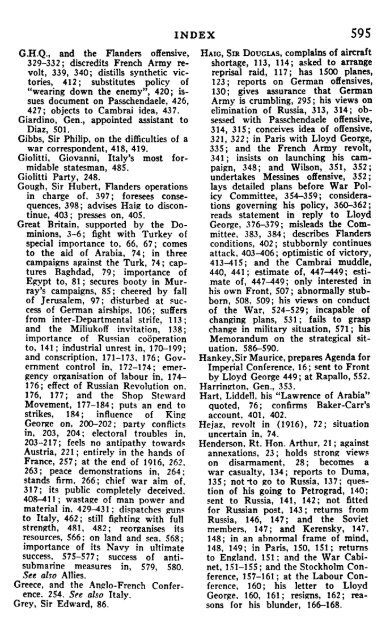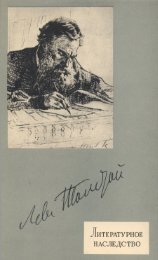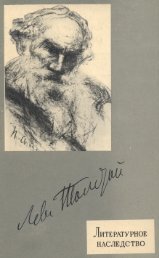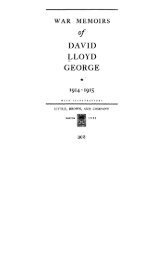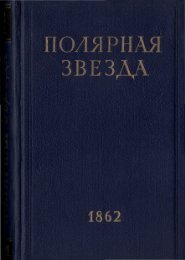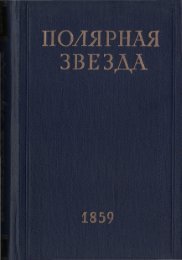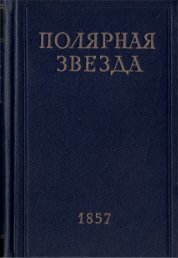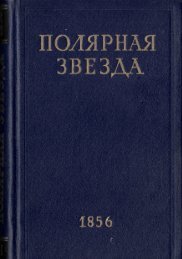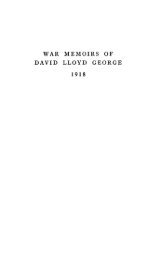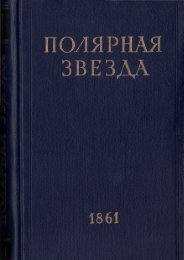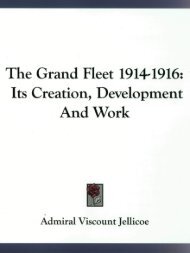WAR MEMOIRS OF DAVID LLOYD GEORGE 1917
WAR MEMOIRS OF DAVID LLOYD GEORGE 1917
WAR MEMOIRS OF DAVID LLOYD GEORGE 1917
You also want an ePaper? Increase the reach of your titles
YUMPU automatically turns print PDFs into web optimized ePapers that Google loves.
G.H.Q., and the Flanders offensive,<br />
329-332; discredits French Army revolt,<br />
339, 340; distills synthetic victories,<br />
412; substitutes policy of<br />
"wearing down the enemy", 420; issues<br />
document on Passchendaele, 426,<br />
427; objects to Cambrai idea, 437.<br />
Giardino, Gen., appointed assistant to<br />
Diaz, 501.<br />
Gibbs, Sir Philip, on the difficulties of a<br />
war correspondent, 418, 419.<br />
Giolitti, Giovanni, Italy's most formidable<br />
statesman, 485.<br />
Giolitti Party, 248.<br />
Gough, Sir Hubert, Flanders operations<br />
in charge of, 397; foresees consequences,<br />
398; advises Haig to discontinue,<br />
403; presses on, 405.<br />
Great Britain, supported by the Dominions,<br />
3-6; fight with Turkey of<br />
special importance to, 66, 67; comes<br />
to the aid of Arabia, 74; in three<br />
campaigns against the Turk, 74; captures<br />
Baghdad, 79; importance of<br />
Egypt to, 81; secures booty in Murray's<br />
campaigns, 85; cheered by fall<br />
of Jerusalem, 97; disturbed at success<br />
of German airships, 106; suffers<br />
from inter-Departmental strife, 113;<br />
and the Miliukoff invitation, 138;<br />
importance of Russian cooperation<br />
to, 141; industrial unrest in, 170-199;<br />
and conscription, 171-173, 176; Government<br />
control in, 172-174; emergency<br />
organisation of labour in, 174—<br />
176; effect of Russian Revolution on,<br />
176, 177; and the Shop Steward<br />
Movement, 177-184; puts an end to<br />
strikes, 184; influence of King<br />
George on, 200-202; party conflicts<br />
in, 203, 204; electoral troubles in,<br />
203-217; feels no antipathy towards<br />
Austria, 221; entirely in the hands of<br />
France, 257; at the end of 1916, 262,<br />
263; peace demonstrations in, 264;<br />
stands firm, 266; chief war aim of,<br />
317; its public completely deceived,<br />
408-411; wastage of man power and<br />
material in, 429-431; dispatches guns<br />
to Italy, 462; still fighting with full<br />
strength, 481, 482; reorganises its<br />
resources, 566; on land and sea. 568;<br />
importance of its Navy in ultimate<br />
success, 575-577; success of antisubmarine<br />
measures in, 579, 580.<br />
See also Allies.<br />
Greece, and the Anglo-French Conference,<br />
254. See also Italy.<br />
Grey, Sir Edward, 86.<br />
INDEX 595<br />
HAIG, SIR DOUCLAS, complains of aircraft<br />
shortage, 113, 114; asked to arrange<br />
reprisal raid, 117; has 1500 planes,<br />
123; reports on German offensives,<br />
130; gives assurance that German<br />
Army is crumbling, 295; his views on<br />
elimination of Russia, 313, 314; obsessed<br />
with Passchendaele offensive,<br />
314, 315; conceives idea of offensive,<br />
321, 322; in Paris with Lloyd George.,<br />
335; and the French Army revolt,<br />
341; insists on launching his campaign,<br />
348; and Wilson, 351, 352;<br />
undertakes Messines offensive, 352;<br />
lays detailed plans before War Policy<br />
Committee, 354-359; considerations<br />
governing his policy, 360-362;<br />
reads statement in reply to Lloyd<br />
George, 376-379; misleads the Committee,<br />
383, 384; describes Flanders<br />
conditions, 402; stubbornly continues<br />
attack, 403-406; optimistic of victory,<br />
413—415; and the Cambrai muddle,<br />
440, 441; estimate of, 447-449; estimate<br />
of, 447-449; only interested in<br />
his own Front, 507; abnormally stubborn,<br />
508, 509; his views on conduct<br />
of the War, 524-529; incapable of<br />
changing plans, 531; fails to grasp<br />
change in military situation, 571; his<br />
Memorandum on the strategical situation,<br />
586-590.<br />
Hankey,Sir Maurice, prepares Agenda for<br />
Imperial Conference, 16; sent to Front<br />
by Lloyd George 449; at Rapallo, 552.<br />
Harrington, Gen., 353.<br />
Hart, Liddell, his "Lawrence of Arabia"<br />
quoted, 76; confirms Baker-Carr's<br />
account, 401, 402.<br />
Hejaz, revolt in (1916), 72; situation<br />
uncertain in, 74.<br />
Henderson, Rt. Hon. Arthur, 21; against<br />
annexations, 23; holds strong views<br />
on disarmament, 28; becomes a<br />
war casualty, 134; reports to Duma,<br />
135; not-to go to Russia, 137; question<br />
of his going to Petrograd, 140;<br />
sent to Russia, 141, 142; not fitted<br />
for Russian post, 143; returns from<br />
Russia, 146, 147; and the Soviet<br />
members, 147; and Kerensky, 147,<br />
148; in an abnormal frame of mind,<br />
148, 149; in Paris, 150, 151; returns<br />
to England, 151; and the War Cabinet,<br />
151-155; and the Stockholm Conference,<br />
157-161; at the Labour Conference,<br />
160; his letter to Lloyd<br />
George, 160, 161; resigns, 162; reasons<br />
for his blunder, 166-168.


